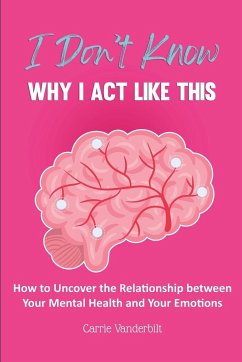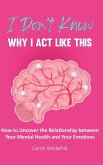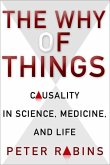Have you ever thought that you might be experiencing the world a little differently than everyone else? For those of us living with various types of mental illness, the moods and emotions we have may not align with how other people around us act. We might fly into a rage when seemingly unprovoked or cry at the drop of the hat. It may feel strange, but what's happening could actually be completely normal, depending on your mental illness and your experiences with trauma and triggers. Have you ever wished you could have the emotions of 'normal' people? Whether people criticize you for being "too numb" or mock you for being "too sensitive," you may find yourself in a whirlwind of emotions without knowing how you got there, why this is happening, and what to do to stop it from happening. The good news is you are not alone. For those who have been diagnosed with: ¿ Anxiety disorder ¿ Bipolar disorder ¿ Post-traumatic stress disorder ¿ Depression disorder ¿ Mood disorder ¿ And other mental disorders Understanding and maintaining your emotions may seem like a real challenge. This book is here to help. How do I know what emotions are real, and which are exacerbated by my mental illness? All emotions are valid, and your triggers and trauma are real. I Don't Know Why I Act Like This: How to Uncover the Relationship Between Your Mental Health and Your Emotions won't take away the pain, or fix you until everything is fine. Instead, it's intended to be a tool to use in cooperation with your regular therapy and medication regime to help you connect further with your own concerns and emotions. You'll learn the answers to questions such as: ¿ Why do I experience emotions the way I do? ¿ How are my emotions impacting my life? ¿ Are there ways to control my emotional responses? ¿ Am I trapped feeling this way forever? Combining years of training, decades of personal experience, and exercises recommended by mental health professionals, I Don't Know Why I Act Like This: How to Uncover the Relationship Between Your Mental Health and Your Emotions will help you tap into your inner resources to understand, appreciate, and connect with the feelings that can leave us feeling trapped in our mental health challenges. This book will not solve all of your mental health problems and is not intended to take the place of any emotional, mental, or physical support you're currently receiving. Instead, I Don't Know Why I Act Like This: How to Uncover the Relationship Between Your Mental Health and Your Emotions allows you the opportunity to walk through the often frightening and confusing landscape of your mind and your emotions to help you sort out what you're feeling and why. Join Carrie Vanderbilt as she shares this journey with you in I Don't Know Why I Act Like This: How to Uncover the Relationship Between Your Mental Health and Your Emotions.
Bitte wählen Sie Ihr Anliegen aus.
Rechnungen
Retourenschein anfordern
Bestellstatus
Storno








